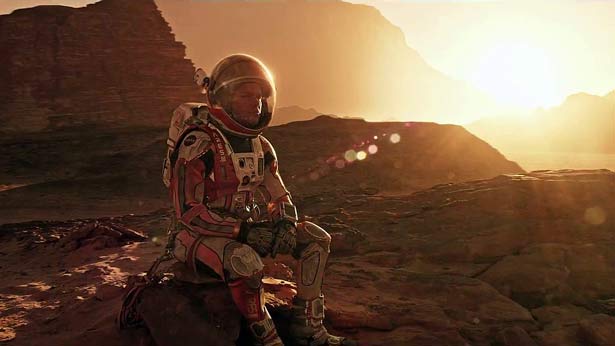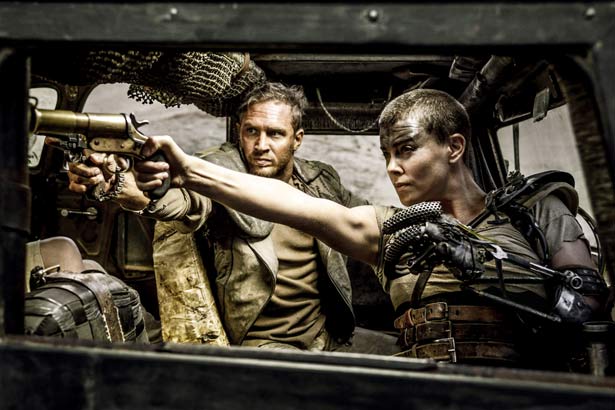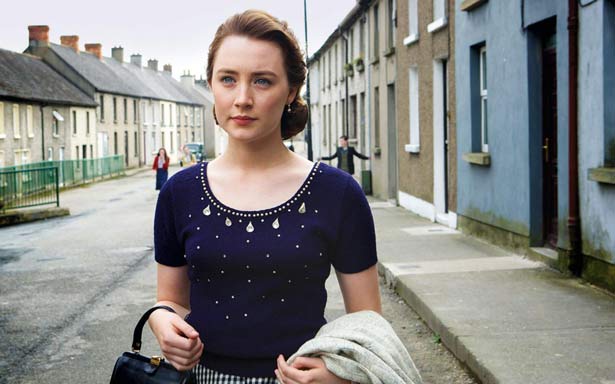
After more than a decade of writing about movies, the Oscars, somehow, still raise a fire in me. I know I will be disappointed. I know there will be one or two wins that seem perfect, one or two speeches that surprise, just like I know that most of the lauded films will be about white men enduring something.
I know the Oscars matter, on a business and cultural level, no matter what the Coen brothers — who’ve conveniently already earned a few — say. Winning is power and power is money, and money lets people decide which stories get told.
This year’s stories are good stories but, by and large, they’re familiar, and made by familiar names. The most familiar story — the one about a young person falling in love and finding her way — is, in an odd twist, perhaps the most subversive of the lot for the way it respects that young woman’s ordinary existence. Life can be complicated enough when it’s just life — bear attacks, interplanetary stranding or not.
 |
| Matt Damon is, once again, marooned in a far-away place in The Martian |
The Confinement
It’s maybe funny to call The Martian a confinement film — dude’s got a whole planet to himself! — but Mark Watney (Matt Damon) lives inside a bubble, a rover or a spacesuit, without a lick of outdoor air. Entertaining and visually appealing though it is, The Martian lacks one key element: characters. Mark can be dry, funny and sarcastic, but everyone else gets single-note personalities: noble (Sean Bean); socially inept (the math guys); efficient (Chiwetel Ejiofor); tense (Kristen Wiig).
As a story of survival, it works, but it’s hollow. Room is the opposite, as much a story of what comes after as a story of the terrible captivity of Ma (Brie Larson) and Jack (Jacob Tremblay). A movie that improves on the novel on which it’s based is a rare bird — and Room is all the more rare, as Emma Donoghue wrote both. She chiseled her own novel into a film that understands “Will they escape?” is only half the question. Then what? How do you spend years confined and then go back to a world of cell phones, computers, cable news, open spaces, soccer balls?
The Martian doesn’t ask about the aftermath. It doesn’t ask much of anything at all. Frankly, The Force Awakens should’ve taken the sci-fi slot, but it’s less concerned with science than it is with myth — and its mythology isn’t the kind the Academy cares for.
The Extremes
What is The Revenant if not mythologizing? The astonishing man on a noble vengeance quest, pushed to extremes, part of a brutal world. While I disliked Alejandro González Iñárritu’s Birdman, I can appreciate it if I squint and tilt my head until all the characters look like part of Riggan’s psyche. There’s no trick that makes The Revenant work like that. It’s an endurance test with beautiful cinematography and, to be fair, a notable nod to the terrible treatment of native people.
We’re hardly lacking in movies about determined white men fighting their way through to something (see also: The Martian, There Will Be Blood, Gladiator). How have the filmmakers — and DiCaprio — so cleverly shifted the narrative around this film to make it mean something? It means that cinematographer Emmanuel Lubezki is a genius to have gotten some of those shots. It means that no one saw Valhalla Rising, another movie about men suffering, though with a change of weather and more hallucinogens.
 |
| Charlize Theron is the baddest bad ass in Mad Max: Fury Road |
On the flip side of everything — of climate, of gender, of theme — are the sweltering sands of Mad Max: Fury Road, a movie just as inventively filmed and edited, just as beautiful, and with so much more to say — about power, destruction, misogyny, freedom, fear and the world we live in. It’s by no means a perfect film, but it’s an action movie with a heart and a mind, built to do much more than just make you feel as if you’ve endured a visual pummeling.
The Ensembles
The Big Short will leave you feeling mentally pummeled, and probably rather depressed. Smart, wry, cleverly playful in its anger, Adam McKay’s film about the corrupt banking system owes some of its palpable sense of rage to Ryan Gosling’s bitter voiceovers, and the delightful, peculiar moments at which the movie breaks the fourth wall.
McKay and his cowriter, Charles Randolph (working from Michael Lewis’ nonfiction book), know that this is a lot of esoteric bullshit to take in, so at times the narrative stops, with celebrities explaining the finer points of mortgage bonds. Dizzying, biting, full of great performances, The Big Short is probably too smart to win an Oscar.
Spotlight comes close to falling into that same category, but is made of more familiar stuff; the necessary-journalists tale is one we know, but it hasn’t yet gone stale. Tom McCarthy’s directorial history is interesting — did anyone even see The Cobbler? — and this steady, persistent, precisely paced film is a giant leap ahead for him. Even knowing the outcome doesn’t water down the tension created by his excellent cast; you never quite know when someone’s going to find that huge breakthrough or slip up in some unforeseen manner. Spotlight pulls off the particular feat of feeling both sturdy and sly.
The Characters
And those two words — sturdy and sly — bring me to the last two best picture nominees, the ones with less high-gloss shine and media spin. Bridge of Spies is dramatic, to be sure, but Steven Spielberg can make this kind of movie while sleepwalking: smooth, smart, unsubtle in its interest in reminding us of the kind of people we can be. (It’s also here to remind us that Mark Rylance is brilliant and underused in film.)
Bridge of Spies is unquestionably timely, concerned with how people can be more than their jobs, more than their families (well, white men can, anyway) and that a nation is only as good as its people.
The grown-up, almost old-fashioned style of Spielberg’s latest shows a sure hand, but I miss the innovative Spielberg, the one who created aliens and adventures and freaking giant dinosaurs. This is the cinematic equivalent of the dad who grew up and got conservative — not socially, but in bearing and demeanor.
 |
| Saoirse Ronan shines in 1950s Brooklyn |
Brooklyn is conservative on the surface, but when you scratch that period-piece façade, you find something rare in this batch of nominees: a beautiful, gently funny (bless every actress in those boarding house scenes) movie that takes the interior life of a young woman entirely seriously.
As Eilis Lacey, Saoirse Ronan carries this film so splendidly that in any year that was not so utterly Brie Larson’s, it would be a crime not to give her every award; you can practically see her eyes changing colors with her moods.
Brooklyn is also about America, and the mythology of coming here shares the screen with the lure of what you’ve left behind, the possibility of other lives that still tempt you, even if the shoes don’t fit. Director John Crowley has a sense of timing that gives every one of Brooklyn’s scenes a thoughtfulness; even a tiny role like that of Eilis’ department-store boss has layers of sympathy. Nothing melodramatic and terrible happens to Eilis, just life in all its 1950s colors and shapes. That such a moving film came out of such traditional shapes is magic in and of itself: This woman’s choices should be her own, then, now, always.